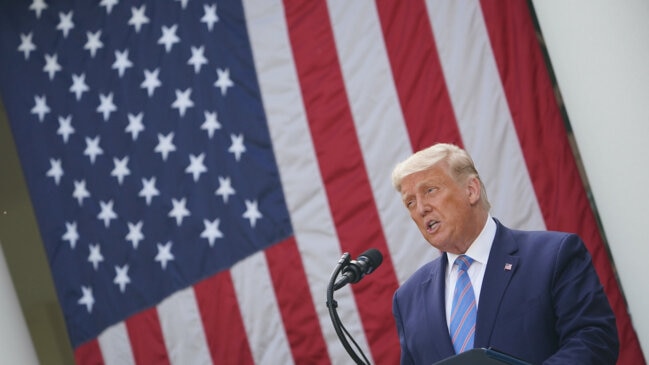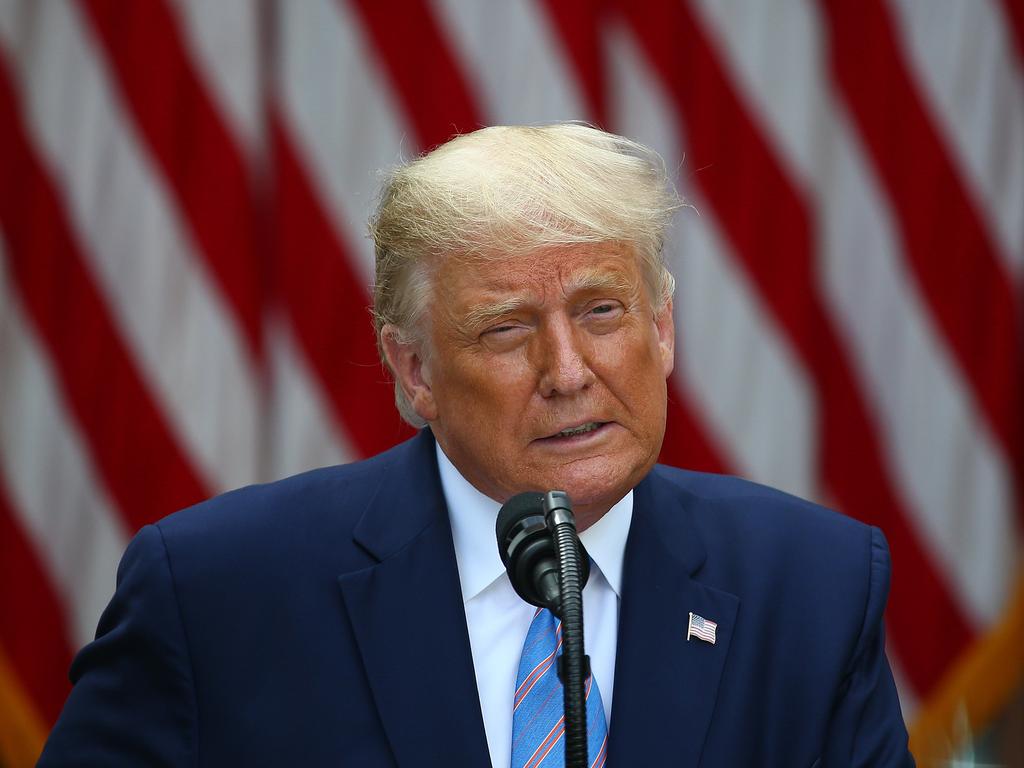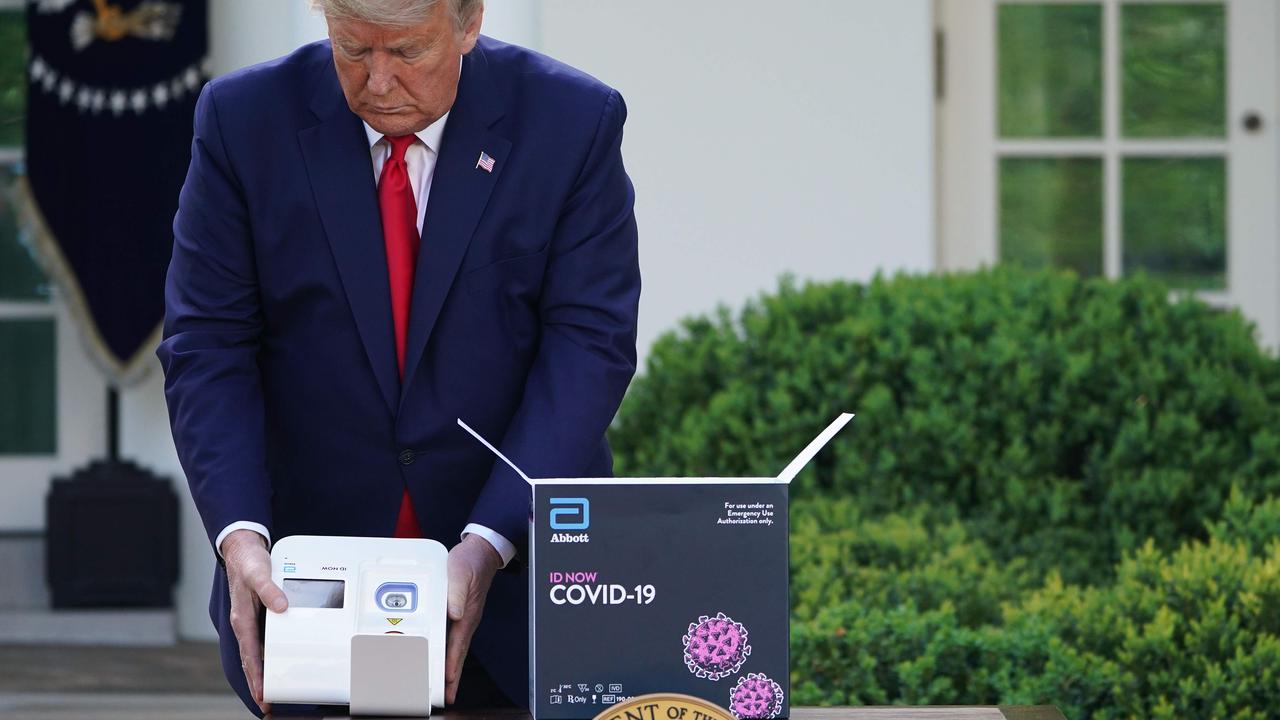Donald Trump announces plan to send out 150 million rapid COVID-19 test kits
Donald Trump has announced the Federal Government will distribute 150 million rapid, point-of-care COVID-19 tests to the states in coming weeks.

US President Donald Trump has announced the Federal Government will distribute 150 million rapid, point-of-care coronavirus tests to the states in coming weeks.
The $US5 ($A7) credit card-sized test kits, produced by Abbott Laboratories, can return a result for COVID-19 within 15 minutes.
While they are less accurate than – and require confirmation from – the more sensitive, standard PCR tests, they will be useful for ending testing bottlenecks and can help health authorities more quickly identify those who should self-isolate.
“No machine is required to process them,” Mr Trump told reporters on Monday.
“In the old days when we just started this you remember we would go out and have to find these massive laboratories with tremendously expensive equipment. Now we’re down to something that you’ll see that is really from a different planet.”
RELATED: Follow our latest coronavirus updates

Some 50 million of the tests will go to schools and vulnerable communities including aged care homes and assisted living facilities.
Similar to those that detect HIV and influenza, the rapid tests detect viral proteins known as antigens.
“After a health care professional conducts a nasal swab of a patient, they insert the swab into the device along with a few drops of solution, which help the material flow across a strip containing antibodies that bind to the virus and create a colour change to signal the presence of SARS-CoV-2 proteins,” Science magazine explained last month.
Coronavirus antigen tests have been developed before but the Abbott version is the first that does not require special laboratory equipment to process.
To put the number in perspective, it’s more than the total number of tests conducted by the US to date.
This week the country passed the milestone of 100 million tests, more around 50 million more than the second placed India.
“We’ve conducted more tests then the European Union, and all of Latin America combined,” Mr Trump said.
The World Health Organisation has also said it wants to distribute 120 million of the tests, supplied by Abbott and SD Biosensor, lower-income countries to help close the testing gap with wealthier nations.
“These tests provide reliable results in approximately 15 to 30 minutes, rather than hours or days, at a lower price with less sophisticated equipment,” WHO director-general Tedros Adhanom Ghebreyesus said, the ABC reported.
“This will enable the expansion of testing, particularly in hard-to-reach areas that do not have lab facilities or enough trained health workers to carry out PCR tests.”
The WHO has an agreement to supply the tests but does not yet fully have the $US600 million ($A845.6 million) in funding to begin rolling them out next month.
“We have an agreement, we have seed funding and now we need the full amount of funds to buy these tests,” he said.

The announcement comes as the Trump administration pushes the states to fully reopen schools for face-to-face teaching.
With the new kits, teachers and parents would be able to get tested on a weekly basis.
It comes as the US Centers for Disease Control and Prevention released data showing nearly 280,000 school-aged children were infected between March 1 and September 19.
The figure accounted for roughly 4 per cent of the total US caseload over this period, with children aged 12-17 approximately twice as likely to be infected as those aged 5-11.
The rate of new cases rose steadily during the spring and then shot up over the summer, peaking on July 19 with an average weekly incidence of 37.9 per 100,000.
The new cases then plateaued for several weeks before declining in late August – though it appears they are now rising again towards summer levels.
The authors wrote that the data helped establish a baseline for monitoring trends of COVID-19 infection as some schools return to in-person learning now and in coming months.
“School studies suggest that in-person learning can be safe in communities with low SARS-CoV-2 transmission rates, but might increase transmission risk in communities where transmission is already high,” they said.
The report provides more data for trends that were already known, such as that Hispanic and black minority groups are at heightened risk of developing severe COVID-19, as are children with underlying conditions.
Overall, 277,285 children were infected, 3240 hospitalised (1.2 per cent), 404 admitted to intensive care (0.1 per cent), and 51 died (0.01 per cent).
The real rates of hospitalisation, intensive care admission and death are likely to be even lower in reality because the actual number of children infected was probably far higher and not recorded, given the number of asymptomatic cases.
Though the risk to children is relatively low, health experts are more worried about the onward transmission risk children could present to their parents or grandparents.
Children in the 5-11 group accounted for 101,503 cases and 20 deaths while those in the 12-17 group accounted for 175,782 cases and 31 deaths.
Chronic lung disease – which includes asthma and chronic obstructive pulmonary disease, for example – was the most prevalent underlying condition.
The rates of infection varied greatly from region to region and the authors emphasised that local authorities should closely monitor the situation to arrive at the best decision about in-person learning.
– With AFP
Continue the conversation on Twitter @newscomauHQ | @franks_chung or frank.chung@news.com.au




